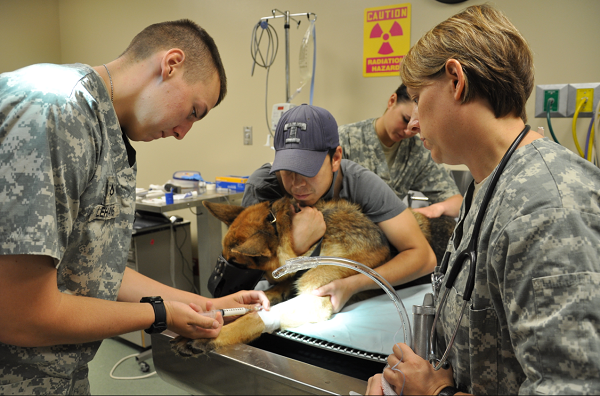Army Animal Care Specialists (MOS 68T) assist with the prevention and control of diseases that are transmitted from animal to human.
Animal Care Specialists also care for government-owned animals.
These specialists assist the veterinarian in the care and treatment of animals.
Qualifications and Training
Recruits who wish to enter into this MOS must receive a minimum score of 91 on the Skilled Technical (ST) portion of the ASVAB test.
To enter into this position, recruits must provide transcripts that show a minimum of 1 year of both algebra and biological sciences at the High School or higher level, with at least a “C” grade.
Recruits must also possess normal color vision and no history of convictions for drugs, illegal weapons, violence, or sexual misconduct.
Job training includes 10 weeks of Basic Combat Training.
Soldiers will then attend Advanced Individual Training for 11 weeks.
AIT includes practice in animal care and patient care techniques, at the Department of Veterinary Science.
It is about 75% hands-on training and 25% classroom work.
Skills that are helpful in this Department of Defense position include:
- Ability to work under stress
- Ability to follow precise instructions under stress
- Enjoy assisting others
- Interest in a career involving science and biology
Related Article –101 Military Care Package Ideas
What are the Job Duties of an Animal Care Specialist?
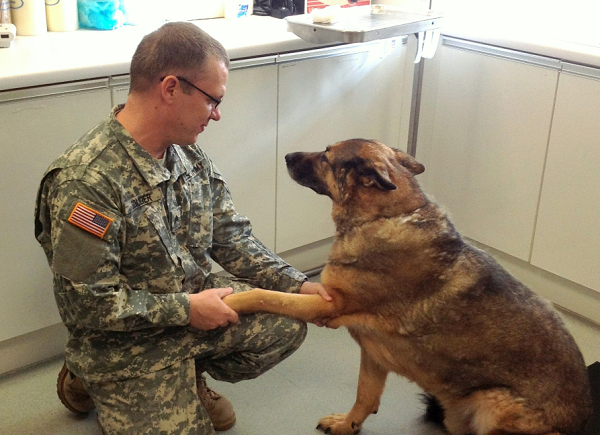
Soldiers in this MOS may work in veterinary clinics, research facilities, or field units in any location, worldwide.
Animal Care Specialists work under the supervision of veterinarians and complete both care and research.
Animal Care Specialists provide routine care for animals in the location where they work.
This can be for government-owned animals, Military Working Dogs, and research animals.
The specialist may also care for personal pets owned by soldiers and their families.
Care is not always given at the clinic. Sometimes, specialists are required to visit the animal in other areas to perform check-ups and treatment.
Research and Disease Prevention
Soldiers in this MOS are tasked with disease prevention.
Disease prevention involves preventing disease in animals and preventing the potential spread of diseases from animals to humans.
Specialists prevent disease in animals by ensuring they have the proper care and treatment.
They also keep a close eye for potential outbreaks of conditions such as Rabies.
When conducting research, specialists will identify parasites or other abnormal issues.
Animal Care
Animal Care Specialists perform a variety of care functions.
They assist veterinarians with ultrasounds, x-rays, surgeries, and exams.
The specialist will conduct an examination of the animal, including checking temperature, checking their mouth/teeth, and feeling for any abnormalities in their skin.
They will complete physical examinations of all animals.
Any abnormalities are reported to the veterinarian for verification and/or further treatment.
If the treatment requires it, the specialist will create a plaster using plaster-casting techniques.
Part of their job is to collect samples including blood and urine.
Specialists will properly restrain animals prior to an exam for the safety of veterinary staff and the animal.
To better diagnose an issue, the specialist will collect ear swabs, skin swabs, and postmortem samples and then run laboratory tests on those samples.
There may be times when the specialist has to assist in the euthanasia of an animal.
Animal care is not always scheduled.
Specialists must assist in emergency situations and be able to work under pressure.
Related Article – Army Dental Specialist (MOS 68E): Career Details
Office Duties
Animal Care Specialists ensure that the veterinary clinic or research area they work in is clean at all times.
They sanitize and clean all cages, research areas, and exam and operating areas.
Part of the office duties includes keeping records of all animal care procedures and animal files.
They may be required to set appointments, take payment, and answer the phone.
Animal Care Specialists will sterilize any surgical equipment used and prepare the equipment for scheduled procedures.
Medications
Animal Care Specialists are trained on the proper way to administer medications.
This can include immunizations and topical treatments.
One treatment that specialists have to perform is placing an animal under anesthesia.
This process requires additional steps and monitoring.
The specialist will review the animal’s history to determine if there are any safety risks to placing it under anesthesia.
They will run calculations to administer the correct dosage, monitor the animal while under anesthesia, and continue observation while it is in recovery.
They are also trained in ordering/receiving medication shipments, organizing the inventory, and running inventory procedures.
The specialist will ensure correct dosages and dispose of expired medications.
See a list of all US Army MOSs here.
Military Working Dogs
Army Animal Care Specialists are the ones who ensure Military Working Dogs are working at top performance.
During training, specialists learn how to clean their teeth, assist them when they are sick, and learn proper injury protocols.
The specialist performs all functions, from checking the dog’s pulse to placing it under anesthesia.
These skills are used in the field in emergency situations and when dogs are brought into the veterinary clinic.
The Army video below provides more information on job duties and training.
What Does an Animal Care Specialist Get Paid?
Animal Care Specialists will receive an annual base pay of around $23,000 a year.
This pay is an estimated amount based on recruits who do not have Military experience.
The amount will adjust while in training and will increase as rank increases.
This estimated base pay does not include allowances, benefits, or special pay opportunities.
You can follow the base pay table below to get an idea of Army pay.
| Insignia | Pay Grade | Rank | Abbreviation | Minimum Monthly Pay |
|---|---|---|---|---|
| E-1 +4 months | Private | PVT | $1,917.60 | |
| E-2 | Private Second Class | PV2 | $2,149.20 | |
| E-3 | Private First Class | PFC | $2,259.90 | |
| E-4 | Specialist | SPC | $2,503.50 | |
| E-4 | Corporal | CPL | $2,503.50 | |
| E-5 | Sergeant | SGT | $2,730.30 | |
| E-6 | Staff Sergeant | SSG | $2,980.50 | |
| E-7 | Sergeant First Class | SFC | $3,445.80 | |
| E-8 | Master Sergeant | MSG | $4,957.20 | |
| E-8 | First Sergeant | 1SG | $4,957.20 | |
| E-9 | Sergeant Major | SGM | $6,055.50 | |
| E-9 | Command Sergeant Major | CSM | $6,055.50 | |
| E-9 | Sergeant Major of the Army | SMA | $6,055.50 |
Related Article –Army Pharmacy Specialist (MOS 68Q): Career Details
Benefits
The Army provides generous benefits in comparison to most civilian positions.
One of the benefits that the Army offers that most civilian positions do not offer is free housing and food to soldiers who live on base.
For those authorized to live off base, the Army provides a generous housing and food allowance.
The Army also has recruiting bonuses for certain positions and special pay for specific scenarios.
They offer an annual clothing allowance for military uniforms.
They also offer tuition assistance programs that allow most soldiers to attend college for little to zero cost.
Army benefits include medical, dental, paid sick time, 30 days vacation, and low-cost life insurance options.
Job Reviews
Most reviews of this position state that the job is what you make of it.
Previous Animal Care Specialists discuss being able to work with animals as one of the positive aspects of the position.
Other positive reviews note that the culture is great.
You gain meaningful relationships, not just with your co-workers, but with the animal owners as well.
Negative reviews note that the position can be demanding.
It is a 24/7 job, as emergencies can leave you working long hours.
Other negative reviews discuss the impact that a supervisor can have on your work.
The reviews below provide an outlook into a day in the life of an Animal Care Specialist.
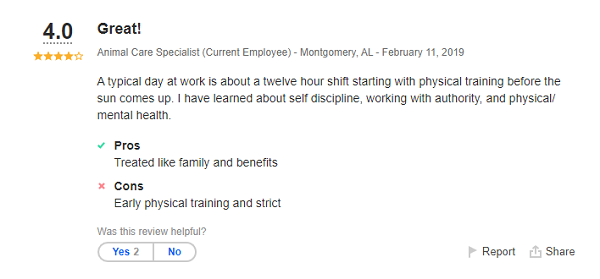
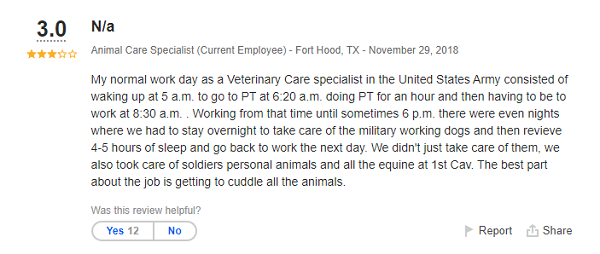
Related Article-Army MOS 25Q: Career Details
Civilian Career Opportunities
Working as an Animal Care Specialist provides experience and discipline.
The skills that are gained in this MOS allow for civilian career opportunities as a veterinary aide or assistant.
It also allows for civilian positions as Nonfarm Animal Caretakers, Laboratory Animal Caretakers,s and Veterinary Technologists.
Through the Army’s COOL program, specialist have an opportunity at receiving certifications that assist with Army promotions and civilian career opportunities.
Some of these certifications can even be funded through the GI Bill.
Certification examples include Certified Manager or Animal Resources and Laboratory Animal Technologist.
Summary
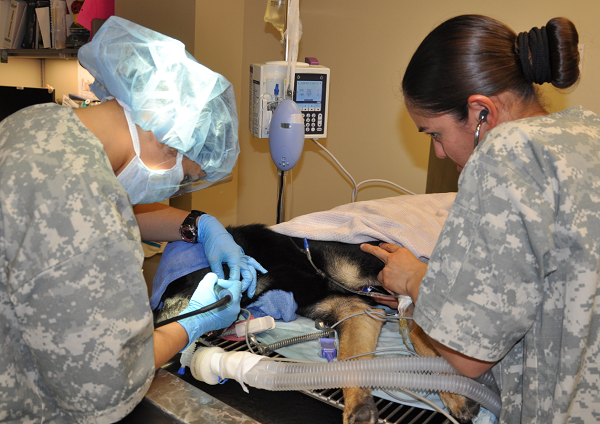
Army Animal Care Specialists (MOS 68T) assist in the care of military animals.
They work under the direction of the veterinarian to prevent the spread of diseases and complete research.
This is an entry-level position that has certain science class requirements and ASVAB testing requirements and requires individuals to attend Basic Training.
Pay for this position will follow the Army base pay table and also includes benefits.
Previous Army Animal Care Specialists review the position as positive for the aspects of working with animals and the camaraderie that is built.
After soldiers leave the Army, civilian career opportunities related to this position include Veterinary Aide or Assistant.
Related Article- Army Practical Nursing Specialist (MOS 68C): Career Details
References
Army Animal Care Specialist Article
- 68 Series MOS: A List of Medical Field Jobs in the Army - June 19, 2024
- 15 Series MOS: US Army Aviation Jobs - June 19, 2024
- 11 General Orders For Each Military Branch - June 19, 2024

